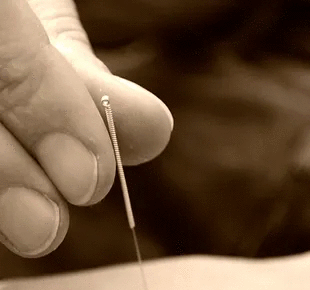
For many people, the idea of having several needles placed on different areas of the body can be a little odd and even distressing. But rest assured, acupuncture has been around for 3000 years and has a very safe track record when performed by qualified practitioners.
The most common question I get asked is hands down, “Does acupuncture hurt?”. In general, the answer is no. But there are certain sensations that can be experienced during an acupuncture treatment. In school, we are introduced to the term “de qi”. De qi literally means “the arrival of qi”. And for many of you reading this, I’m sure you’re asking yourself what does that even mean. So let’s dig a little deeper.
De qi can be felt by the patient as a variety of sensations, such as a sense of warmth around the point, a feeling of local pressure, movement or tingling away from the point, or occasionally a small electric shock. Many times, when placing needles, I can also feel the arrival of qi. It can seem like the patient’s body is “gripping” the needle and alerts ne that the point has become active and the patient’s body is responding. It is for this reason that de qi is so important. Acupuncture practitioners must make sure not only to locate each point correctly, but also to verify that each point in use is activated properly and performing its desired function.
In studies performed at the School of Acupuncture, Moxibustion and Tuina at the Beijing University of Chinese Medicine, the de qi sensations were differentiated. The study was a comprehensive meta-analysis of multitudes of studies on de qi sensations and related physiologic responses. The research across many studies showed a direct and positive correlation between changes in nervous system activity and brain responses to de qi arrival. The research showed that the different subjective de qi experiences can actually be differentiated into the types of nerve fibers that carry those responses. It turns out that de qi related numbness is transmitted by different nerve fibers than heaviness. De qi related soreness is transmitted by yet another type of nerve fiber. The researchers noted studies showing that these different subjective experiences reflect measurable differing nerve fiber transmissions and therefore, differences in brain region stimulation.
It was also noted that specific acupuncture points have distinct de qi characteristics. Intensity of soreness, fullness and heaviness varies according to the specific acupuncture point chosen. These differences persist between acupuncture points that are along the same acupuncture meridian and acupuncture points that have similar tissue structures. Much of the work in this area leads investigators to suggest that nerve innervation has a major influence on de qi sensation.
Another interesting finding is that achieving de qi at acupuncture points elicits distinctly different cortical responses than at non-acupuncture points. The researchers suggest that much of these findings point to de qi having a different effect on the central nervous system dependent on the acupuncture points chosen. Specific acupuncture points demonstrate a consistent and unique ability to stimulate specific brain regions upon de qi stimulation. This explains why not everyone gets the same treatments, even if they have the same diagnosis.
One more note, the de qi sensation is not always achieved, but this doesn’t mean that the needles aren’t working to balance your body. It might just mean that there is more work to be done to achieve that balance. Lastly, never be afraid to let your acupuncturist know if something is uncomfortable. A good practitioner will always want you to feel as comfortable as possible, with or without the arrival of de qi.

